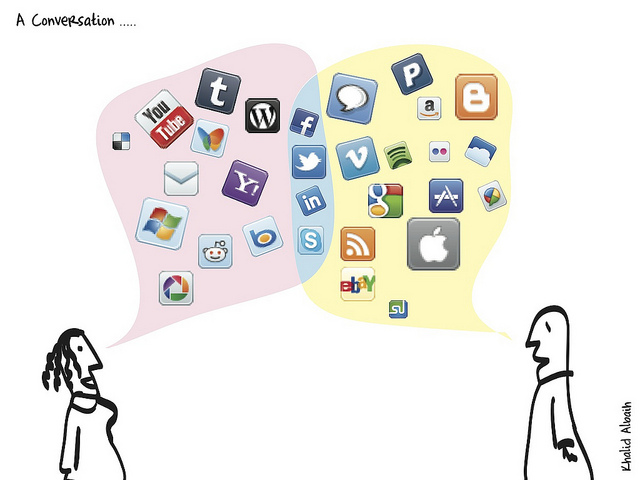A recent speaking engagement reminded us that many business owners have a very… outdated view on social media.
Noticing that the audience looked confused after some ten minutes of talking about the value of social media to small businesses, Kris took a minute to pause. “How do you currently use social media?” Kris asked. When the first answer was “Facebook stalking—and that’s about it,” we quickly realized that the folks we were talking with still viewed social media as a personal tool—but not much else.
In our experience, that view of social media is more common with small business owners than you might think. To help clear up some of the misinformation out there about how businesses can and should use social media, we thought we’d take a shot at myth-busting some of the most common myths we’ve heard about social media.
Here are three—and why they’re wrong:
1. Social media is for youngsters, and that’s it. Social media is just for the kids—right? Not really. While young people are on social media, and do have their own preferences as to which platforms they use and why, the current demographics of who’s on social media may surprise you.
According to the Pew Internet Project, as of September 2014, 74% of online adults use social networking sites. Seventy-one percent use Facebook, 23% use Twitter, 26% use Instagram, 28% use Pinterest, and 28% us LinkedIn. Eighty-nine percent of adults aged 18-29 use social media, followed by 82% of adults aged 30-49, 65% of adults aged 50-64, and 49% of adults aged 65+. Seeing a trend here? Social media is ubiquitous. It doesn’t matter whether your business targets teenagers or C-Levels aged 50+. If you’re looking for them, they’re probably on social media.
2. Social media has no business impact. Tied in with the idea that social media is only for Millennials is the idea that social media has no business benefits whatsoever. Don’t get us wrong—social media for businesses is still marketing, and marketing has always been more difficult to measure than other business units. Heck, a 2013 study by Tata Consultancy Services showed that44% of businesses hadn’t yet measured their return on social media(38% of consumer companies did, however, report a positive return). Businesses are still struggling to quantify exactly how their social media is impacting their growth.
Don’t mistake that lack of clarity—or lack of clear connection compared to what you might find in measuring the ROI of a recent R&D effort—for a lack of impact. Hubspot research shows that in 2012, 77% of B2C companies acquired customers from Facebook, and 43% of B2B businesses had done the same. Hubspot research also showed that in 2013, 79% of companies that blog reported positive ROI for inbound marketing. That’s real business growth originating on social media.
Lead generation isn’t the only benefit, either. Want to build brand awareness? You’d be hard-pressed to find a better medium for spreading the word about your brand than social media. Looking to connect with potential clients? Why aren’t you on LinkedIn? Want to manage a community of donors? Yep, you guessed it—social media is where it’s at.
Use analytics to track your social media, and while the answer might not be as cut and dry as you’re used to, you should at least be able to extrapolate as to what type of impact your social media is having. Gone are the days of throwing shit at the wall and seeing what sticks. It may be tough to track ROI directly, but solid execution paired with robust analytics can tell you a lot about what social media is actually doing for your business.
3. Social media is for the intern. This may be my favorite myth—that social media can just be passed off to the intern or some other poor soul who’s forced to balance doing a good job on social media with doing a good job at whatever it is they’re getting paid to do in the first place. Handing it off to the intern does a lot of things wrong, including putting your brand in the hands of someone who may or may not care, and banking on the fact that they’ll actually even have the time or interest to do a halfway decent job.
Social media is an investment—so start treating it like one! A quality social media team will make your brand better, and will also—more importantly—allow you to focus on your core competencies. Instead of spreading your employees thin in something they’re not great at, focus on what you kick ass at and hone in on it. Everything else—including social media—can (and often should) be outsourced. Teams like ours here at SMC are designed from the ground up to help you communicate better and focus on what you’re best at. You bring the business, we’ll bring the communications.
While a majority of businesses these days are on social media (84% of B2B marketers use social media in some form, says Aberdeen Group), increasingly, those that aren’t are disconnected from social media’s very real business benefits.
If you and your business fall into the latter category, don’t fret—there’s still time to get active and involved on social media. As we hope we’ve shown here, what you know about social media may very well be wrong. If you’d like to learn more about how your business can get on social media, or if you’ve already made the jump and are looking for help, Contact Us! We’d love to help your business become a better communicator.
Photo credit: CC by Khalid Albaih



